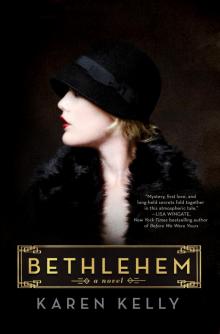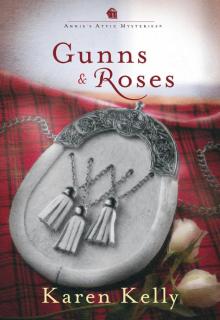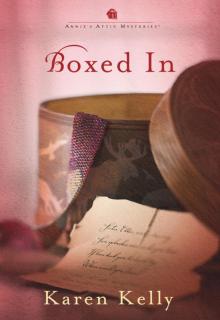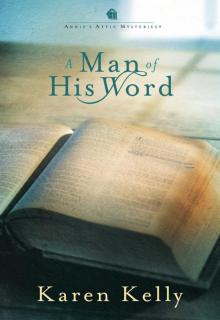- Home
- Karen Kelly
Bethlehem Page 7
Bethlehem Read online
Page 7
Wyatt was standing behind Helen, looking bashful with a porkpie hat in one hand and a bouquet of daisies in the other. Helen turned and left the room, urging Wyatt forward as she passed him in the doorway.
“I’m sorry about what happened,” he said, shyly holding out the flowers. “I thought maybe these would cheer you up.”
As Susannah looked at the bouquet, a rogue wave of despondency surged over her. The vast expanse between her grief and a simple bunch of flowers struck her as absurd. She knew that Wyatt’s impulse was true and sweet and kind. Rationally, she could appreciate it. But it felt as though someone were offering her incense for her thirst, or a painted fan for her hunger.
Wyatt must have read her expression, because suddenly he seemed to consider the gesture ridiculously feeble. He actually groaned. And that—combined with the mortification on his face—yanked Susannah from the undertow and made her laugh out loud.
Wyatt’s smile was hesitant, and when he looked over his shoulder to see if he was missing something, Susannah laughed even harder, an uncontrollable chortle that made her clutch her sides. With a dubious glance at the daisies, Wyatt shrugged and walked to the goldfish bowl on the windowsill, shoving the stems into the watery realm of Gill, the bowl’s sole occupant.
Now there were tears streaming down Susannah’s face, and she could hardly catch her breath. Wyatt crossed the room and sat down next to her, and Susannah leaned her head onto his shoulder. Cautiously, Wyatt put his arm around her; after a few moments her hysteria subsided to a stuttering, spent sigh. She rested there, silent now as her shoulders trembled and tears continued to roll down her cheeks. And then—very gently—Wyatt kissed her.
Five
OCTOBER 1962
“As I live and breathe, if it isn’t Hedy Parrish!” Doe threw her hands in the air as she came around the bend. “I was beginning to think I’d have to come up to Fountain Hill and get you myself!” Smiling broadly, she strode to the wheelchair and laid her hands upon Helen’s shoulders, leaning down to plant a kiss on her cheek.
“Well, Dorothy, I wouldn’t put it past you.” Helen smiled and patted Doe’s arm. “I believe you could outdo Sisyphus and roll a boulder right up that hill if the spirit moved you.”
“Hah!” Doe threw back her head with a sharp laugh. “That’s a pithy comparison—Sisyphus, doomed to spend eternity in the kingdom of the dead!” She gave an appreciative wink to Joanna. “Still as sharp as a pin, this one.” Stepping back, she took in the impeccable St. John suit and Ferragamo pumps—replete with matching handbag. “Still dressing like a charwoman, I see.”
“And you, my dear, are still dressing like a scarecrow.” Helen’s eyes twinkled at her friend.
Joanna felt a warm appreciation for the ease with which the two old women fell into cozy companionship. She was no longer baffled by the relationship; she knew now how the ranks had come to be leveled.
In the weeks since school started, she had found herself at St. Gregory’s on many an afternoon. She had been relieved that the kids were occupied and making friends, but she hadn’t realized what a gaping hole their absence would leave. In the mornings, Wayne, the chauffeur, delivered Charlie to school—a scenario that seemed preposterous to Joanna as she watched her little boy slide into the backseat of the old Rolls Royce with his lunch box. But Daisy went to afternoon kindergarten, so most days Joanna walked her to school at noon, and at the end of the day she would walk home with both children. It helped fill her days. She liked to find ways to pass the afternoon hours in town, avoiding the extra hike up the hill and back. If the weather was dreary, she might take in a movie at the Palace, or stop into the Cozy Spot for a cup of coffee or a sandwich, and she wandered regularly into McCrory’s for sundries like stockings or lipstick. But there was only so much shopping she could do, and on pretty days she often found herself strolling through the green serenity of the cemetery.
Occasionally she came upon Doe, who always seemed to welcome a break from her gardening. From the beginning, Joanna had been curious about how a young newlywed couple had become the caretakers of the cemetery, and it wasn’t long before she asked Doe about it.
“Well, I guess you could say that Nico had two choices: he could earn a living by coaxing things out of the ground, or he could earn a living by coaxing things into the ground.” Doe laughed at her own joke, turning sideways on the bench to settle in. “I’ll tell you just what happened. Not long after Nico proposed, his uncle died. Until then we’d been planning to scratch out a piece of land and grow barley. We both come from long lines of farmers. But you know, if you’re not the oldest son, you’re out of luck. My father was the youngest of five, so he left the farm and opened a flower shop. You’ve probably seen it—Meiers Florist over on Union? That’s where I met Nico. He came in to pick up a corsage for another girl and we struck up a nice conversation. After a bit, he left the shop with the box in his hand—but a minute later he turned right around and came back to buy another one. I wore that corsage pinned to my apron for three days.” She smiled, shaking her head a little at the memory.
“Nico and I were going to borrow the money for a down payment on a hundred-acre parcel over toward Quakertown. Then fate stepped in, I like to think. Nico’s uncle Jakob had taken care of this place for decades—practically from the time the Moravians opened it to the public. He never married—lived in Grange House all by himself. When he died, there wasn’t anyone to run the show. One of the deacons had to step in to bury the gravedigger! After the funeral, we were standing right over there”—she pointed to a copse of beeches—“and while they lowered his coffin into the ground, I just looked up and decided I was home.” She paused for a moment, gazing around. “Who better to run the place than a farmer and a florist’s daughter?”
It was such a simple explanation, and Joanna saw that it made perfect sense. Life for a farmer and his wife could be brutally harsh. Taking care of the grounds and the burials at St. Gregory’s was a comparatively lovely job, and it came with the added benefit of a sizable house. Joanna was almost envious, now that she thought about it.
“How did you come to know Helen?” She hadn’t forgotten Doe’s easy familiarity with Frank’s grandmother, and it still seemed oddly incongruous to her.
Doe hesitated for a moment, and then gave Joanna a small, sad smile. “As you may expect, it isn’t a happy story. But that is, after all, the nature of the business. We hadn’t been here more than a few months … just starting to get the hang of it, as they say”—she clasped Joanna’s forearm companionably—“when a man showed up one cold afternoon. He was tall and distinguished-looking, quite handsome in a homburg and a cashmere coat—I’ll never forget it. And he was very young, not much older than we were.” She looked into the distance, thinking for a moment. “Twenty-eight, as it turned out. But, oh … that face was sad. It had what I call the deep blues. There’s a sort of shadow that sorrow casts—it’s hard to describe.” She shook her head slowly. “He needed a burial plot, of course. Nico usually showed people around the grounds to pick out a grave site—I didn’t get involved in that. But that day something made me follow along. I don’t know why. I guess I just felt sorry for the poor man, and thought maybe I could help. Anyway, Nico showed him several nice plots, but the poor fellow wouldn’t say a thing; he just walked along silently with his hands in his pockets. Eventually we came to that rise over there.” She pointed toward a group of headstones overlooking the river valley. “And he stopped. I can still see the look on his face. It was like he was lost. It nearly broke my heart. I was such a greenhorn. I’ve seen that look a hundred times since.
“I felt like I should say something to make it easier, but I had no idea what. So I just started rambling on about the view and the trees, and I said something silly about having plenty of room. Oh, I felt so foolish, and he just hung his head. There we stood—Nico and I—shivering in the wind and waiting. Finally he spoke. He didn’t look up; he just stared at a spot on the ground, and then he said the sadde
st thing: ‘We don’t need a lot of room. It’s for a baby.’”
That was how Joanna learned that Hollins and Helen Parrish had buried their first child. The little girl’s sweet headstone was the first in the row of family markers. Doe pointed it out—a delicate alabaster marble, carved with the name CECILIA PARRISH over the face of a cherub, and a heartbreaking five months between the dates of birth and death.
According to Doe, Helen became a near-permanent fixture in the cemetery that year, sitting for hours by Cecilia’s grave, watching the distant waters of the river, or simply closing her eyes and listening to the birds sing. It was during that time that the two young women had forged a bond, and the ensuing years had seen them lean on each other through births and deaths, and—though she didn’t specify what—much that happened in between.
Now Joanna watched as the old friends clasped hands and beamed at each other. She could feel their kinship like a vibration. Doe sat down on the bench next to Helen’s wheelchair and patted Joanna’s leg. “I’ve been getting to know this lovely girl,” she said. “She’s a keeper, Hedy. And if she’s willing to cart you down here, all the better.” She narrowed her eyes admonishingly. “Be careful you don’t scare her off with your bossy demands, now.”
Joanna laughed. When Helen had called her aside after dinner the night before and asked if she wouldn’t mind taking her to the cemetery, Joanna had been more than happy to oblige. Helen’s hip had healed and she could walk with her cane, but she didn’t trust herself on uneven ground—and when she learned that Joanna was becoming a regular, she seized the opportunity. Joanna could see the old woman’s face light up as they made it a date.
Wayne had driven them as far as the gates—folding the wheelchair into the trunk of the Silver Cloud—and would wait while they visited the Parrish section of the cemetery. It did have a lovely view, with the valley spread out below them like a ribbon unfurling, and the river sparkling in the mellow autumn sun. Little Cecilia’s headstone had company now: Her father was there next to her. Frances and Charles Collier were in the next row, as were both of their sons, now that Wyatt had died. Someone had had the foresight to keep the two families in close proximity. Joanna had noted the extra space reserved next to Hollins for his wife, and there was room by Wyatt’s headstone for Susannah’s. It was a little unsettling.… She couldn’t avoid a grim extrapolation.
But the impalpable graces of autumn were weaving their magic, and she pushed the morbid speculation out of her head with a deep, luxuriating sigh. The warmth of the fading sun on an early October afternoon and the smell of drying leaves had an ethereal effect on her, bringing forth a sublime feeling of nostalgic longing—soft and sweet and sad—combined with a thrilling, unspecific anticipation. An anticipation that had nothing to do, she told herself, with the sight of Daniel carrying a ladder over his shoulder as he moved toward an ailing willow.
Doe beckoned him over with a wave. “You’ll finally get to meet my grandson,” she told Helen. “He’s been a lifesaver around here.”
“I’m delighted for you, my dear. I’ve been remiss. Until Joanna told us, I had no idea he was back. What a help it must be.” Helen smiled across the lawn at the young man as he settled the ladder under the tree.
Daniel pulled a kerchief from his back pocket and wiped his hands with it as he strode toward the women—a gesture that had become familiar to Joanna. “Good afternoon, ladies.” He wore his customary solemn expression, but Joanna knew now that it was misleading.
It had been on her first afternoon without the children that she had quite literally stumbled across Daniel cutting back plants by the gate on Church Street. She had just delivered Daisy to her first day of kindergarten, and the goodbye had gone swimmingly. Joanna had been prepared for a teary last-minute change of heart, but Daisy was so preoccupied by the playmate potential that she didn’t even notice her mother leaving. And so, it was with a very light heart that Joanna strolled down the sidewalks, exulting in the solitude. She couldn’t remember the last time she had been out on her own. The idea that she could do anything she wanted for the next three hours—without having to consider another single soul—made her almost giddy. She couldn’t even bring herself to go into any of the shops; the requirements of social propriety would have been too imposing. She wanted to wander at will, with nothing to compromise her freedom.
North Bethlehem was a lovely part of town, with its cobblestones and leafy boulevards. She strolled down High Street—the grand Colonial homes arrayed on sprawling, manicured lawns—and then turned onto Church Street, where the narrow brick row houses were perched right up to the ancient, heaving pavers of the sidewalk. She wandered past the Widows’ House and the Old Chapel, stopping occasionally to read a plaque on a doorway or a historical marker on a small plot of grass. Many of the old buildings were pre-Revolutionary—erected by the first Moravian settlers—and to Joanna there was elegance in their rustic stone simplicity.
Crossing Main Street, she descended a steep, winding hill, and then climbed back up again, treading carefully on the buckled paving stones. A couple of blocks farther up the street leveled out and she found herself looking across at Grange House—so stately behind the tall iron fence. And there she saw Daniel, kneeling by the Avonlea lilies that bordered the gate. At that moment she stepped on a crooked, jutting paver, and with the twist of an ankle she folded to the ground.
She hadn’t had time to pick herself up when he appeared at her side, crouching to offer his hand. “May I help you?” The question was posed with the same placid formality she remembered from before.
More embarrassed than injured, Joanna blushed at her clumsy display. “You’re very kind, thank you.… I’m just fine.” She shifted to one knee to push herself up, and he clasped her elbow, pulling her easily off the ground. She winced a little when the weight settled on her ankle, but the pain was minor and by wiggling her foot a little she knew she could work it out. She brushed her hands together and dusted off her skirt.
“I have it on good authority that the sidewalks in Bethlehem are in collusion with the cemetery.” The comment was delivered with solemn gravity, and it took Joanna a moment to realize Daniel was making a joke.
She smiled up at him, noting again the startling translucency of his eyes. “Are you giving away trade secrets?”
He gazed at her for a moment and then his serious countenance broke into a charming, transforming grin. And there was something in the combination of the gaze and the grin that made Joanna look away.
Since that day, there had been several chance meetings among the tombstones. She wasn’t seeking him out, of course, but it was only natural that she would linger for a moment to visit. It was only being friendly. At first she was disconcerted by his quietness, but in time she learned that he wasn’t shy or aloof; he simply lacked the impetus to make small talk. She found that she could sit near him as he worked and feel as if an entire conversation had taken place, though neither of them had uttered more than a few words.
Joanna had come to understand that it was Daniel’s austere upbringing that had molded his behavior. Doe had commented on it one day, as she told Joanna about an incident that had happened that morning. Her grandson had been installing the pedestal of a limestone monument when it started to slip off the base. He had to wedge his hand under the sharp, chiseled edge to save it. Before anyone could come to the rescue, he managed to heave it upright with his shoulder, never uttering a sound. She told Joanna that it was a quality imbued from his childhood—a preternatural composure that the Amish referred to as gelassenheit.
Joanna had also learned that he could be startlingly direct, a trait that could still catch her off guard. Just the other day, as she sat in the sun near the hole he was digging, Daniel had turned to her and said, “Does your husband know you’re here?”
Something in the way he said it made her chest contract. He was looking at her in that unflinching way, and for a moment she was struck dumb. As she struggled to form a response, something
in him changed. His eyes shifted away, and when he looked back at her, there was the slightest trace of an amused smile on his lips. He raised one eyebrow and said, “Because according to my grandmother, this place is crawling with spooks.”
That was when she started to notice that Daniel had inherited something of Doe’s teasing nature. Later, when she told him she could never tell when he was kidding, he looked down at her and, in his typically measured way, said, “A grave demeanor is a job requirement.”
Now, as Doe made the introductions, Daniel tilted his head in a small, respectful bow and cradled Helen’s hand. “Very pleased to meet you, ma’am.”
“Dear boy, you are a godsend to your grandmother,” Helen said, smiling up at him. “I’ve been receiving excellent reports.”
His glance landed on Joanna for the briefest second before he turned to his grandmother. “Have you been spreading rumors again?”
“Don’t look at me,” Doe replied. “I only said there was an extra mouth at the table and a trail of broken shovels on the ground.”
Helen patted Daniel’s hand and turned toward Joanna. “You’ve met my grandson’s wife, I understand.”
He looked straight at her but didn’t say a thing. By now Joanna knew that was just his way, his nature … but it felt so personal, so intimate that she felt a warm flush cover her face.
“Oh, they’re becoming fast friends,” Doe interjected before Daniel could respond. “Joanna has been keeping us both company.”
“Isn’t that lovely?” Helen looked evenly from Joanna to Daniel. “I’m so glad Joanna is getting out and meeting people. I’m sure Frank is happy to know that his wife is making friends.”
Was Joanna imagining it, or was the reference to her husband made by design?
Daniel met Helen’s gaze with his trademark equanimity, and the corners of his eyes crinkled almost imperceptibly as he gave her a slight nod. “I aim to please.”

 Bethlehem
Bethlehem Gunns & Roses
Gunns & Roses Boxed In
Boxed In A Man of His Word
A Man of His Word